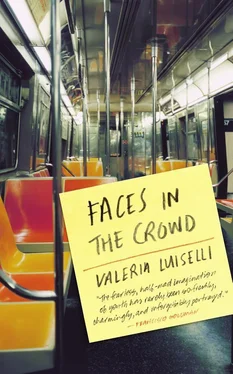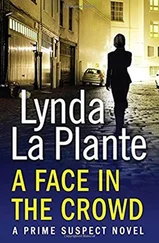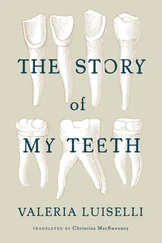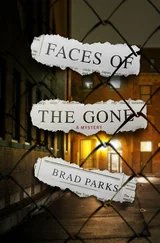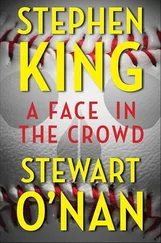*
Over the next few months, I returned to the Columbia University library several times in search of books, newspapers, or archives, whatever might cast a little light on the period Owen spent in New York. Nothing. But I took out Zvorsky’s That and read it with great care.
On White’s recommendation, I began to keep a record of anything that bore any relationship to Owen. I made notes on yellow Post-its and, when I got back to my apartment, propped them on the branches of the dead tree, so as not to forget, so as to return some day and organize them. The idea was that when the tree was bursting with notes, they’d begin to fall from their own weight. I would gather them up as they fell and write the story of Owen’s life in that same order. The first one was:
Note: The NY subway was constructed in 1904, the year of Owen’s birth.
I still have these notes. When we moved to this house, I took them out of the envelope I’d put them in years before, when I left that city, and stuck them on the wall opposite my writing desk. The boy is learning to read and spends hours by the wall trying to find some meaning in those Post-its. He doesn’t ask me questions. My husband, on the other hand, wants to know everything.
*
Dakota used to sing in three or four different bars and, when she needed extra cash, she sang in the subway. One night I went to see her in a station on the 1 line. I took my wooden chair and placed it against the platform wall, facing the rails. Dakota and her boyfriend had installed themselves in the middle of the passage. He was playing the guitar beside her and looking at her the way ventriloquists do their dummies, the way parents look at their children. The trains went by to one side of them. It was obvious that he despised and respected her at the same time. The trains stopped in front of me. He adored her and was afraid of her. He played well that night, and she sang as I had never heard her before. But none of the hundreds of people who alighted from the trains stopped to listen. Dakota’s public persona was a mixture of Vincent Gallo’s languid elegance and Kimya Dawson’s rakish ease. She had a sturdy build and moved with the grace of a cabbage, but the timbre of her voice carried along the platform and pierced my head with the blunt violence of sorrows that run deep. A train stopped. Behind Dakota I thought I saw Owen’s face among the many other faces of the subway. It was only for a second. But I was sure he had seen me too.
*
Note (Owen to Celestino Gorostiza): “New York has to be seen from the viewpoint of the subway. The flat horizontal perspective vanishes in there. A bulky landscape begins, with the double depth, or what they call the fourth dimension, of time.”
*
Dakota liked my dead tree. And I liked her liking it.
It keeps me company and we talk about lots of things, she once said.
And what does it say to you?
It doesn’t say anything, it’s dead.
She watered it while I was away on a work trip. Spring had arrived and flowers were blooming everywhere. The narcissi are always first, Dakota explained, that way they do some kind of poetic justice to their namesake’s eagerness to be seen. But the tree wasn’t budding. When I got back from my trip, Dakota had made me fish and spring greens. We drank a bottle of wine. She told me she wanted to leave her boyfriend, and asked if she could live with me for a while, until she found a place of her own.
Why are you leaving him?
I’m not sure.
Dakota had beautiful features. She liked to say she had a ravaged face — she’d read Marguerite Duras in her early twenties and had got the idea that beauty was a French kind of thing. And perhaps that was true. Dakota looked a little like Anaïs Nin and had her hair cut short like Jean Seberg in À bout de souffle .
*
Moby wasn’t interested in the tree holding Owen’s future story. He used to hang his gloves on it when he came to the apartment, as if it were a hat stand.
*
I never unearthed anything important or revealing during my library searches, but I lied to White. I told him that, in the small, disorganized library of Columbia University’s Casa Hispánica, I had found an original, badly typed and barely legible, in which were a series of annotated translations of poems by Owen. The translations were almost certainly by Zvorsky, I said: They’re signed JZ&GO. It was the most unlikely of all possible lies about Owen, and White never believed it, but he decided to go along with me. I promised to bring him my own literal transcriptions of the text. I was hanging my hopes on the idea that, by making Owen sound like Zvorsky, I could convince White to publish him.
*
Dakota moved in with me. She turned up with a grass-green suitcase in one hand and a new bucket in the other. When I didn’t spend the night elsewhere, we both slept in my bed, though Dakota almost always got back very late from work. She would get into bed naked and put an arm around my equally bare waist. She had soft, heavy breasts; small nipples. She used to say she had philosophical nipples.
*
My husband has started reading some of these pages again. Did you use to sleep with women? he asks.
*
If you really want to get under a person’s skin, make an accusation about their moral hygiene. That’s what Salvatore used to say. He was an elderly biologist from Naples who lived on the tenth floor of my building. Salvatore and I met in the elevator. He had a tangle of white hair on his head, a hooked nose, enormous nostrils edged with crusts of snot. We were both going to the basement, where the washing machines and the trash cans were located. I was carrying a bag of dirty laundry; he his trash. He wasn’t carrying trash, he had junk in a gray suitcase. Stuff, he said when I asked him what he had in there. Standing by the trash cans, he took out his things, separated them into small piles, and slowly deposited them in the different containers. Standing by one of the machines, taking longer than usual to carry out my modest hygiene ritual, I watched him out of the corner of my eye. The last thing he took out was an old record player. I went over and asked if it worked. Yes, it did. He let me take it back with me. I’ll give you some records later, he said. He never kept his promise. But one day he invited me to dinner on the tenth floor.
*
But have you ever slept with a woman? my husband asks again. No, never, I reply. I wouldn’t know how.
*
Note: Owen used to weigh himself every day before getting on the subway. There was a weighing machine in the 116th Street station that confirmed his belief that he was disintegrating: 126 pounds, 125 pounds. He never knew how many kilos he lost a week.
*
Before we moved to this house, my husband, the boy, and I lived in a tiny, dark, ground-floor flat. The only place with any natural light was the bathroom, where we had an old washing machine next to the bathtub, and a small cupboard full of medicines, jars of cream we never used, and sometimes coffee cups, and dirty socks that had lost their pair. The day we did the pregnancy test my husband sat on the washing machine while I peed. The bathroom was our adult corner and those were our places, the toilet seat and the washing machine: there we made decisions, there we quarreled so the boy wouldn’t hear. I bungled the first test and he had to go and buy another. While he was out, I put all the clothes I could find scattered around the apartment on to wash. I added the tea towels, our sheets, and a teddy bear. The boy, who was at that time still the little boy, was watching a cartoon in the living room. I kissed his hair and closed myself in the bathroom again. When my husband came back, he sat on the machine and I peed three drops of pee. This time I didn’t mess anything up. I lowered the toilet lid and put the test on it. I sat on the edge of the bathtub and waited, resting my head on my husband’s legs, which were rocking gently with the damp, heavy, uterine, circular purr of the washing machine.
Читать дальше
